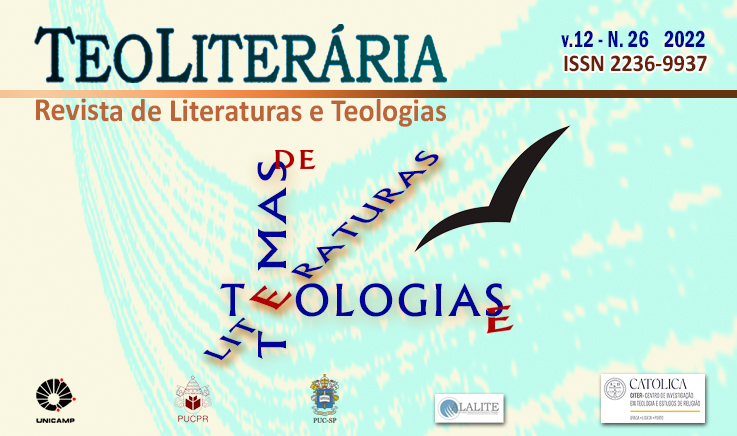The theological and literary origins of Satan in Milton’s “Paradise Lost”
DOI:
https://doi.org/10.23925/2236-9937.2022v26p103-121Keywords:
Satan, Devil, John Milton, Paradise LostAbstract
John Milton’s devil is different from the grotesque figure that is usually associated with Satan. He is humanized, a rebel who faces moral conflicts, is intelligent and courageous. Traces of the narrative and theology of the Miltonian devilish rebellion can be found in the Bible, in Jewish apocalyptic literature, in patristic literature, in early Christian texts, and in medieval and Protestant Christian texts as well. This bibliographical research aims to discover the literary and theological trajectory that led to the devil of Milton, evaluating how much of these elements Milton retains in his poem, and how much it is original. According to this research, Milton did not deny his cultural heritage, but neither was it just a reflection of it. He took control of the construction of his character and presented the world with an unforgettable work that literarily represents the transformations in Western thought from the passage from the Middle Ages to the Contemporary Age.
References
AGOSTINHO, Santo. A Cidade de Deus, parte I. Petrópolis: Vozes; São Paulo: Federação Agostiniana Brasileira; Bragança Paulista: Editora Universitária São Francisco, 2017.
BAGEHOT, Walter. John Milton. In: HUTTON, Richard Holt (ed.). Literary Studies. V. 1. 2ª ed. London: Longmans, 1879, p. 173-220. Disponível em: <https://bit.ly/3sx9TtS>. Acesso: 09 nov. 2018.
BLOOM, Harold. Anjos caídos. Rio de Janeiro: Objetiva, 2008.
CALVIN, John. The Institutes of the Christian Religion: an introductory textbook on the protestant faith that remains influential in the western world. Seattle: Pacific Publishing, 2011. p. 193. Disponível em: <https://bit.ly/3H4zNJw>. Acesso em: 19 jan. 2020
CAREY, John. Milton’s Satan. In: DANIELSON, Denis (ed.). The Cambridge Companion to Milton. Cambridge: Cambridge University Press, 1989, p. 160-174.
DANIELSON, Dennis R. Milton’s good God: a study in literary theodicy. Cambridge: Cambridge University Press, 1982.
DAVIES, Brian: EVANS, G.R. (eds.). Anselm of Canterbury: the Major Works. New York: Oxford University Press, 1998.
FERNANDES, Fabiano Seixas. Introdução. In: MILTON, John. Paraíso Perdido. Traduzido por António José de Lima Leitão. São Paulo: Martim Claret, 2018, p. 7-16.
FERNANDES, Fabiano Seixas. O Satã de John Milton. In: MAGALHÃES, Antônio Carlos de Melo, et al (orgs.). O demoníaco na literatura. Campina Grande: EDUEPB, 2012, p. 125-137.
JUNG, Viviane Brunhilde. Liberdade para obedecer: uma espiadela nas influências teológicas de John Milton em Paraíso Perdido. Vox Scripturae - Revista Teológica Internacional, São Bento do Sul, v. XXVII, n. 2, (p. 217-251), mai-ago 2019. Disponível em: <https://bit.ly/3swtMBf>. Acesso: 22 jan. 2020.
LANGLAND, William. Piers Plowman - a modern verse translation. Jefferson: McFarland & Company, 2014.
LEWALSKI, Barbara K. Genre. In: CORNS, Thomas (ed.). A Companion to Milton. Oxford: Blackwell Publishing, 2003, p. 3-21.
LEWALSKI, Barbara K. The life of John Milton: a critical biography. Oxford: Blackwell, 2002.
LEWALSKI, Barbara K. Paradise Lost and the Rhetoric of Literary Forms. Princeton: Princeton University Press, 1985.
LINK, Luther. O diabo: a máscara sem rosto. São Paulo: Companhia das Letras, 1998.
MARTINES, Paulo Ricardo. A liberdade em Anselmo de Cantuária. Tese (Doutorado). Campinas: Universidade Estadual de Campinas, Instituto de Filosofia e Ciências Humanas, 2000.
MATHEWS, Justin Lee. Paradise Lost and the Medieval Tradition. Dissertação de Mestrado. Bowling Green: Western Kentucky University, 2008. Disponível em: <http://digitalcommons.wku.edu/theses/28>. Acesso: 08 out. 2018.
MCGRATH, Alister. Christian literature: an anthology. Oxford: Blackwell, 2001.
MCMANUS, Hugh. The Pre-Existent Humanity of Christ in Paradise Lost. In: Studies in Philology, vol. 77, n. 3, p. 271-282, 1980. Disponível em: <https://www.jstor.org/stable/4174044>. Acesso: 07 set. 2018.
MILTON, John. Paraíso Perdido. Traduzido por António José de Lima Leitão. São Paulo: Martim Claret, 2018.
MILTON, John. A Treatise on Christian Doctrine: compiled from the Holy Scriptures alone. Traduzido por Charles R. Sumner. Cambridge: Cambridge University Press, 1825. Disponível em: <https://bit.ly/32zScPC>. Acesso 23 jan. 2018.
MUCHEMBLED, Robert. Uma história do Diabo: séculos XII – XX. Rio de Janeiro: Bom Texto, 2001.
PAGELS, Elaine. The Origin of Satan. New York: Random House, 1995.
PESSOA, Fernando. Páginas de estética e de teoria e crítica literárias. Lisboa: Ática, 1966.
PRAZ, Mario. A Carne, A Morte e o Diabo na Literatura Romântica. Campinas: Unicamp, 1996.
RAJAN, Balachandra. The Problem of Satan. In: DYSON, A. E.; LOVELOCK, Julian (eds.). Paradise Lost: a casebook. Hong Kong: Macmillan, 1973.
ROCHA, Claudecir de Oliveira. Poemas satânicos no Brasil. Dissertação de mestrado. Universidade Federal do Paraná, Curitiba, 2014. Disponível em: <https://bit.ly/3ektuFh>. Acesso em 12 out. 2018.
RUMRICH, John P.; DOBRANSKI, Stephen B. (eds.). Milton and heresy. Cambridge: Cambridge University Press, 1998.
RUMRICH, John P. Milton Unbound: Controversy and Reinterpretation. Cambridge: Cambridge University Press, 1996.
RUSSELL, Jeffrey. Lucifer: the Devil in the Middle Ages. New York: Cornell University Press,1984.
RUSSELL, Jeffrey. Satan, The Early Christian Tradition. Ithaca: Cornell University Press, 1981.
SCHAFF, Philip (ed.). St. Augustin’s City of God and Christian Doctrine. New York: The Christian Literature Publishing Co., 1890. Disponível em: <https://bit.ly/3ekkWhZ>. Acesso: 22 jan. 2020.
SCHÜLER, Arnaldo. Dicionário enciclopédico de teologia. Canoas: Editora ULBRA, 2002.
VATTER, Hannes. The Devil in English Literatute. Bern: Francke Verlag Bern, 1978.
Published
How to Cite
Issue
Section
License
Copyright (c) 2021 Teoliteraria - Journal of Literatures and Theologies (On Line) ISSN 2236-9937

This work is licensed under a Creative Commons Attribution 4.0 International License.
TeoLiteraria – Journal of Literatures and Theologies owns the copyright of all published material. The whole reproduction of the articles of this Journal in other publications or for any other purpose, by any means, requires a written permission of the editor of this journal. Partial reproductions of articles (abstracts, more than 500 words text, tables, figures and other illustrations) must have a permission written by the publisher and the authors.

